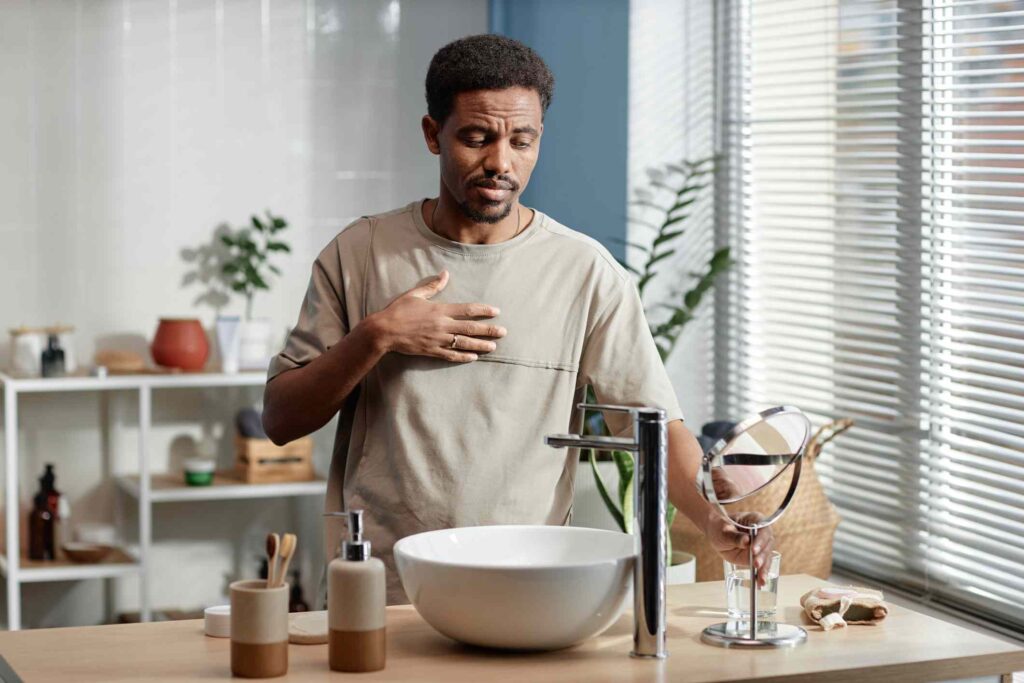If you have puffy nipples, you may notice an increase in the size of your nipple, areola, and surrounding breast tissue. This enlargement can be caused by several conditions, including a hormonal imbalance, lifestyle choices, underlying health conditions, drug use, and prescription medications.
Puffy nipples will often resolve on their own or with lifestyle changes. However, there are also treatments and procedures that can be used when appropriate.
Puffy nipples occur when one or both nipples and the surrounding areola are swollen or enlarged. In some cases, you may feel a small, rubber-like lump under the nipple. The nipple area may also feel sore, especially if the enlargement is related to gynecomastia.
While having puffy nipples is usually not harmful, it can be emotionally distressing. People with enlarged or protruding nipples may experience low self-esteem or a reduced quality of life. They may worry about their physical appearance and try to mask their nipples under clothes.
Puffy nipples can be caused by various conditions and lifestyle choices. However, the most common cause of puffy nipples is related to hormone imbalances, specifically a condition known as gynecomastia. Possible causes of puffy nipples include:
- Hormone imbalances: Changes in nipple size and appearance are often caused by an imbalance in the primary sex hormones estrogen and testosterone. This can occur in infancy, during adolescence, and while aging. Hormones may also change when a person becomes overweight or obese.
- Medical conditions: Certain underlying health conditions can increase the likelihood of puffy nipples, such as chronic liver disease, kidney failure, and thyroid conditions.
- Drug use: Using anabolic steroids or overusing drugs like alcohol, marijuana, heroin, or amphetamines can also lead to nipple enlargement.
- Prescription medications: Sometimes, prescription medications can cause puffy nipples. Some common medications that affect nipple size include chemotherapy, medications for the prostate, corticosteroids, and HIV medications.
- Genetics: Some people are predisposed to having puffy nipples. Genetics can influence how body fat is distributed as well as one’s appearance.
- Body fat: In some people, puffy nipples are caused by body fat distribution, especially when someone is overweight or obese. Losing weight and exercising may reduce the size of the nipples in some cases.
Most of the time, having puffy nipples is not a cause for concern. However, if it is distressing or affecting your quality of life, you should see a healthcare provider. You should also talk with a medical professional if your nipples are large, uneven, or painful.
Other signs you should see a doctor include:
- A lump in the breast area that feels hard or firm
- Discharge from the nipples, especially if it is dark or bloody
- Breast soreness or discomfort
- Sudden change in nipple size, color, or texture
- An ulcer, sore, or other wound on the breast or nipple
- Continued enlargement or uneven growth
- Feeling distressed or embarrassed by your appearance
There is no specific treatment for puffy nipples. The condition often goes away on its own, especially when it occurs in babies and teens. If a medical condition is causing your puffy nipples, a healthcare provider may recommend treatment for the underlying condition, which may reduce the size of your nipples.
A doctor may also adjust your medications if they determine your prescriptions are causing your nipples to enlarge.
If you are particularly worried about the appearance of your nipples or they are causing you distress and impacting your quality of life, there are surgical procedures that can change the appearance of your nipples. You may also want to consider talking to a mental health professional who can help you become more accepting of your body type.
Research suggests about 30-65% of males will experience puffy nipples at some point in their lives. If a hormone imbalance during puberty or genetic predisposition is the cause of puffy nipples, there may not be much you can do to prevent them from occurring. It is a naturally occurring process within your body.
You can reduce the likelihood of puffy nipples from other causes by eating a nutritious diet, exercising regularly, and avoiding drug and alcohol use.
You can also ask your healthcare provider about the medications you are already taking. Some prescription medications and supplements can increase the likelihood of developing puffy nipples.
Having puffy nipples is common and usually not a cause for concern. In most cases, it is caused by a hormonal imbalance. Other causes may include drug use, prescription medications, underlying health conditions, and lifestyle choices.
Treating enlarged nipples may require changes in medications, weight loss, or lifestyle changes, depending on the cause. If you are concerned about your puffy nipples, worried that they are getting worse, or notice sudden changes, talk to a doctor. You should also see a medical professional if having enlarged nipples is causing you distress or interfering with your quality of life.


